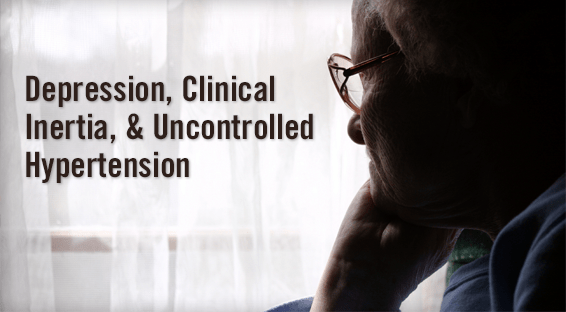Depression has been identified as a risk factor for a poor prognosis among patients with cardiovascular disease. Few studies, however, have investigated the association between depression and clinical inertia, which has been defined as the lack of intensifying treatment for those who are not meeting evidence-based goals for care. In addition, data are lacking as to whether a diagnosis of depression is connected to clinical inertia in patients with uncontrolled hypertension.
Examining the Connection
To address this research gap, Ian M. Kronish, MD, MPH, and colleagues had a study published in JAMA Internal Medicine that examined data from 158 older adults with uncontrolled hypertension. The study patients also had blood pressures (BPs) that were above goal, defined as at least 140/90 mm Hg for most patients or at least 130/80 mm Hg for those with diabetes or chronic kidney disease. Depression was noted in the electronic medical record for 45% of patients in the study.
“Among patients with uncontrolled hypertension, those with depression were less likely to have their treatment intensified to achieve BP goals,” says Dr. Kronish. Clinical inertia occurred in 70% of patients with depression and 51% of those without depression, according to results. This difference remained significant even after excluding depressed patients who had at least one documented home or clinic systolic BP reading below goal and after adjusting for patient-reported medication non-adherence.
Assessing the Implications
“Clinical inertia may be one mechanism by which patients with depression have worse cardiovascular outcomes,” says Dr. Kronish. “That said, there may be cases in which clinical inertia is appropriate. More qualitative studies are needed to explore the reasons why clinical inertia occurred more commonly in patients who were labeled as depressed.”
The study by Dr. Kronish and colleagues demonstrates that depression has a significant impact on the treatment of hypertension. In some cases, clinicians have historically believed that their patients’ depression was more pressing than the hypertension, Dr. Kronish says. “For example,” he says, “if BP elevations are modest over the long term, it is commonly believed that managing hypertension might be optimized by first dealing with depression. Our findings illustrate that we may need to develop different approaches to managing patients with multiple medical problems.”
In the future, Dr. Kronish hopes that clinical investigations will explore the underlying processes that affect clinician treatment practices when managing patients with depression. He is also hopeful that studies will explore the efficacy of concurrently treating hypertension and depression. “In the meantime,” he says, “physicians should be cautious about undertreating cardiovascular risk factors, including hypertension, among patients identified as having depression.




 TimH
TimH